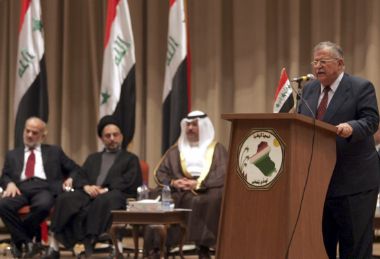|
Iraqi lawmakers OK last-minute amendments
(AP)
Updated: 2005-10-13 08:40 The charter's passage is a key goal of the United States, since failure would
mean months more political instability and would delay U.S. plans to start
pulling troops out of Iraq.
Sunni Vice President Ghazi al-Yawer said the amendments meant Sunnis had to
work harder in the December parliamentary elections to ensure a strong presence
in the next parliament to try for future, deeper changes in the constitution.
They have only 17 members in the current 275-member parliament after largely
boycotting Jan. 30 elections.
"This is the best we have. We have to be practical," al-Yawer said. "This has
opened the door for major amendments of the constitution. This will happen
through participating in the elections. The more turnout there is, the more
chances there are for amendments."
Iraq's top leaders, including the Kurdish president and Shiite prime
minister, lined up on stage before the gathered lawmakers in parliament, lauding
the deal as a show of unity between the country's often divided factions and
communities.
"We have the right to be proud in saying that today was a day of national
consensus," President Jalal Talabani said. "So congratulations to our people for
their constitution."
The hour-long session, attended by 159 of parliament's 275 members — ended
without the lawmakers voting on the amendments, but Parliament Speaker Hajim
al-Hassani said no actual vote was necessary and that the compromise was
approved.
The deal had already been accepted by the main parties in parliament after it
was reached Tuesday night following three days of marathon negotiations,
shepherded by U.S. officials. U.S. Ambassador Zalmay Khalilzad attended
Wednesday's parliament session.

Iraq's President Jalal Talabani (R) gives a
speech during a special session of the Iraqi National Assembly in
Baghdad's green zone October 12, 2005. Iraqi leaders amended a draft
constitution on Wednesday just three days before it goes to a referendum
but many minority Sunnis rejected the compromise and insurgents struck
again, killing some 30 in a suicide bombing. Also present are (L-R) Iraq's
Prime Minsiter Ibrahim Jaafari, Shiite cleric Abdul-Aziz al-Hakim, head of
the Supreme Council for the Islamic Revolution in Iraq and Iraq’s Vice
President Ghazi al-Yawar.[Reuters] | Washington welcomed the compromise as a positive step. "We believe the
political process should be inclusive," said White House spokesman Scott
McClellan.
But McClellan added that the Bush administration expected to see "continued
violence because the terrorists understand how high the stakes are in Iraq."
Under one of the main changes introduced Wednesday, the upcoming parliament
will form a committee that will have four months to recommend new amendments.
These amendments must be all approved by parliament, but by a simple majority
rather than a two-thirds majority that would normally be required. They would
then go to a national referendum.
That gives the Sunnis a window to bring about the deeper changes they want.
They fear that the powers given to the Shiite and Kurdish mini-states will leave
them in an impoverished central zones, without access to oil wealth concentrated
in the north and south.
But there is no guarantee they will succeed in winning the future amendments.
Their proposed amendments would still have to get through Shiite-Kurdish
resistance in parliament. Then they can be defeated in the popular referendum
that follows if two-thirds of the voters in any three of Iraq's 18 provinces
vote "no."
Another significant amendment assures Sunni Arabs that they will not be
purged in Iraq's De-Baathification program simply for belonging to Saddam's
ousted Baath Party. Many current Sunni Arab political leaders were Baath members
and insist only those who actually committed crimes should be prosecuted.
Others emphasize the country's links to the Arab world over those to the
Islamic world — a concern of Sunnis who see Iraq's Shiite majority as drawn to
neighboring Shiite-majority Iran — and reinforce the use of the Arabic language
in Kurdistan, the autonomous zone of the non-Arab Kurds.
Still others — such a new article committing the government to promote sports
— were added at the suggestion of letters from the public.
At least 438 people have been killed in militant violence in the last 17 days
as insurgents try to scare voters away from the polls Saturday.
On Wednesday, for the second day in a row, a suicide attacker hit the
northwestern town of Tal Afar.
The bomber set off explosives hidden under his clothes at the first of two
checkpoints outside the army recruiting center in Tal Afar, where men were
gathering to apply for jobs, said army Capt. Raad Ahmed and town police chief
Brig. Najim Abdullah. They said at least 30 people were killed and 35 wounded.
A day earlier, a suicide bomber killed 30 civilians and wounded 45 when he
plowed his explosives-packed vehicle into a crowded outdoor market in Tal Afar.
Al-Qaida in Iraq claimed responsibility for that attack.
In August, U.S. and Iraqi forces conducted a major offensive in Tal Afar, 93
miles east of the Syrian border, claiming to have killed 200 insurgents and
driven many others out.
Also Wednesday, the military announced that two U.S. soldiers died and one
was injured when their vehicle rolled over while on patrol during combat near
Balad, 50 miles north of Baghdad.
The crash brought to 1,962 the number of members of the U.S. military who
have died since the beginning of the Iraq war in March 2003, according to an
Associated Press count.
|